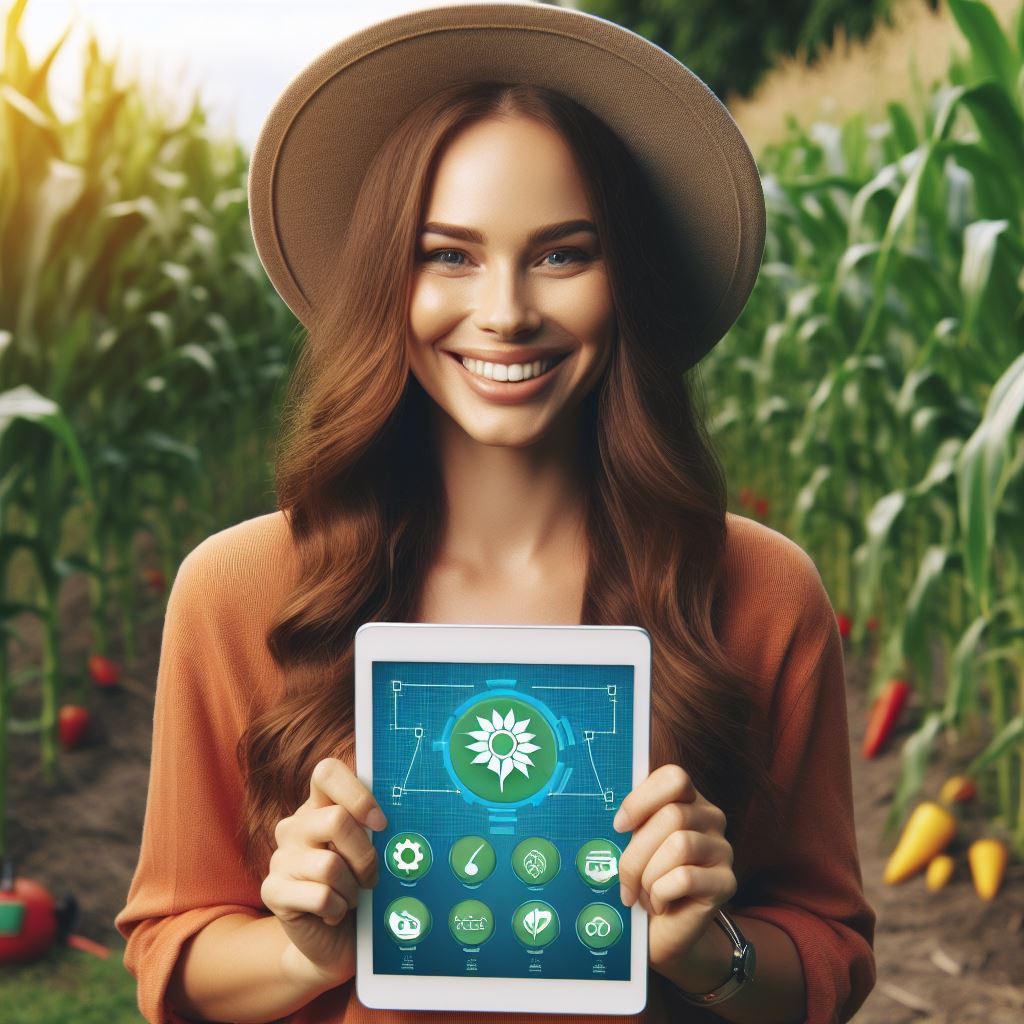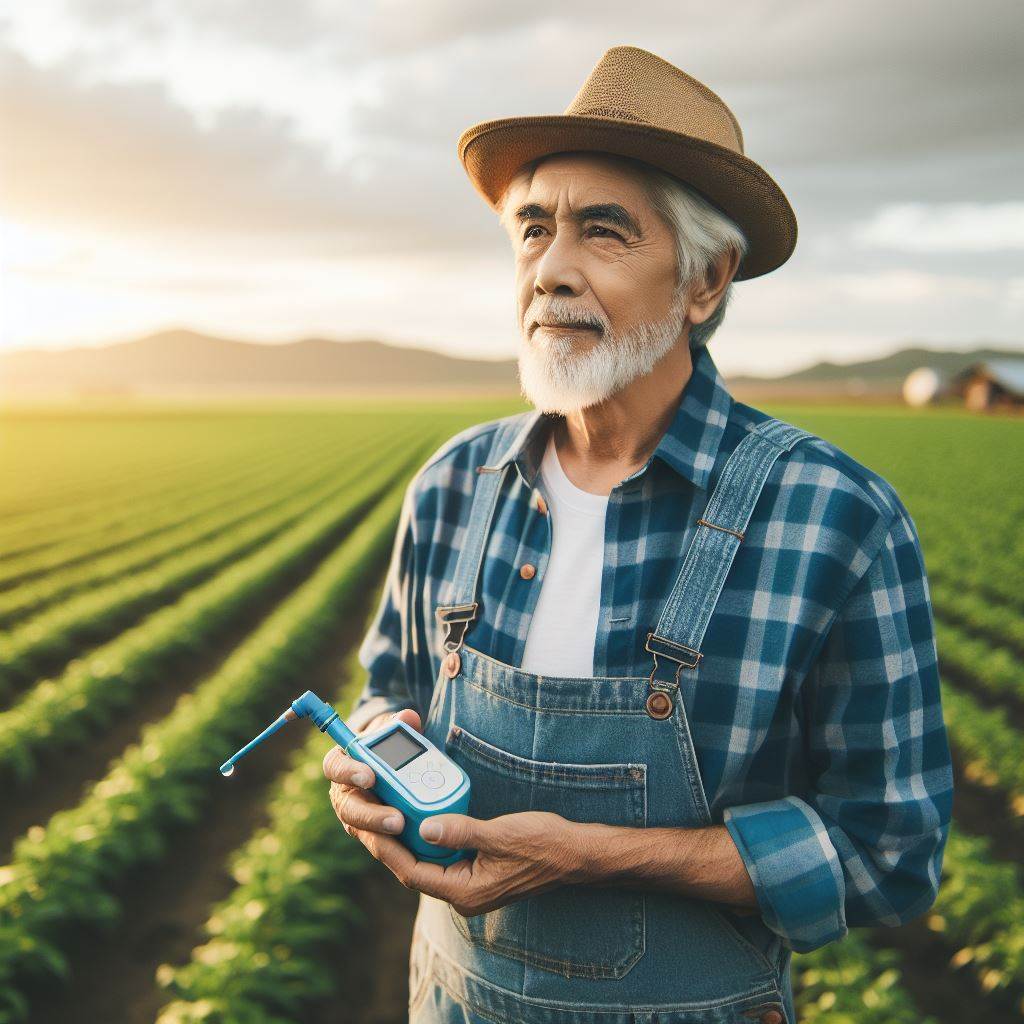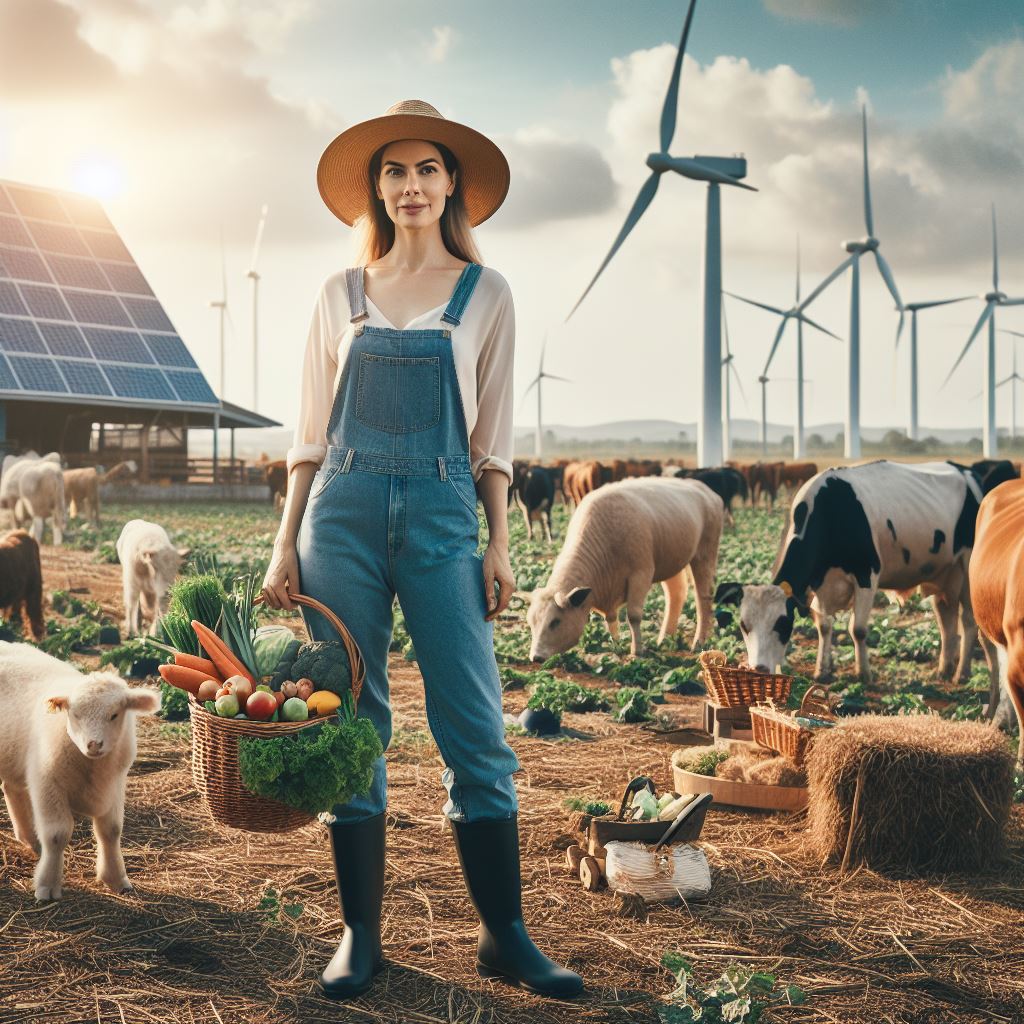Introduction
Irrigation is pivotal in farming, ensuring crops receive adequate water for optimal growth and yield.
With the emergence of irrigation apps, farmers can now manage watering schedules and monitor soil moisture levels with ease.
These apps represent a significant advancement in agricultural technology, offering convenience and precision in irrigation management.
Technology plays a crucial role in modern agriculture, empowering farmers with tools to enhance efficiency and sustainability.
By harnessing the power of smartphones and data analytics, irrigation apps revolutionize traditional farming practices.
They provide real-time insights, allowing farmers to make informed decisions about irrigation needs.
Additionally, irrigation apps contribute to water conservation efforts by minimizing wastage and maximizing efficiency.
With the increasing demand for food production and environmental concerns, the adoption of technology-driven solutions like irrigation apps becomes imperative.
These apps not only streamline irrigation processes but also contribute to the overall productivity and profitability of farming operations.
In essence, irrigation apps represent a significant innovation in agriculture, bringing the benefits of technology directly to the fingertips of farmers.
Benefits of Using Irrigation Apps
Using irrigation apps offers numerous benefits to farmers and growers.
These technological tools provide convenience, accessibility, and improved efficiency in managing irrigation systems.
Let’s take a closer look at the advantages of using irrigation apps.
A. Convenience and accessibility
One of the primary benefits of using irrigation apps is the convenience and accessibility they offer.
Farmers can monitor and control their irrigation systems remotely, eliminating the need for manual intervention.
This saves considerable time and effort, allowing farmers to focus on other essential tasks.
With the help of irrigation apps, farmers can easily access information about their irrigation systems from anywhere.
They can check the status of the system, adjust settings, and analyze data conveniently through their mobile devices.
This level of ease and accessibility enhances overall efficiency in irrigation management.
Transform Your Agribusiness
Unlock your farm's potential with expert advice tailored to your needs. Get actionable steps that drive real results.
Get StartedB. Precision irrigation
Another significant advantage of irrigation apps is their ability to facilitate precision irrigation.
These apps provide valuable data on soil moisture levels and weather conditions, enabling farmers to make informed decisions regarding irrigation.
By knowing the moisture content of the soil and the current weather conditions, farmers can optimize water usage and prevent over or under-irrigation.
Irrigation apps allow farmers to set up customized irrigation schedules based on real-time data.
They can adjust the timing and duration of irrigation cycles to match the specific needs of different crops and soil types.
This precision irrigation approach helps conserve water resources while ensuring optimal conditions for crop growth.
C. Real-time alerts and notifications
- Irrigation apps also offer the advantage of real-time alerts and notifications.
- These apps can send instant alerts to farmers in case of system malfunctions or unusual conditions.
- For example, if there is a leak in the irrigation system or a sudden drop in water pressure, the app will promptly notify the farmer.
- Timely alerts ensure that farmers can take immediate action to address any issues and prevent potential crop damage.
- By receiving notifications on their mobile devices, farmers can quickly respond to emergencies, make necessary adjustments, or contact professionals for assistance.
- This proactive approach helps protect crops and maintain the efficiency of the irrigation system.
In short, irrigation apps provide numerous benefits to farmers and growers.
The convenience and accessibility offered by these apps allow for remote monitoring and control of irrigation systems, saving time and effort.
Moreover, the precision irrigation capabilities of these apps enable farmers to optimize water usage based on real-time data.
Lastly, the real-time alerts and notifications ensure timely action to prevent crop damage.
With the continuous advancement of technology, irrigation apps are becoming indispensable tools in modern agriculture.
Read: 2024’s Top Smart Irrigation Systems Reviewed
Features of Popular Irrigation Apps
Irrigation apps have revolutionized the way farmers manage their irrigation systems.
These apps offer advanced features that make irrigation more efficient and sustainable.
In this section, we will explore the various features offered by popular irrigation apps.
A. Soil Moisture Monitoring
One of the key features of irrigation apps is soil moisture monitoring.
These apps are integrated with sensors that provide accurate readings of the soil moisture levels.
With this information, farmers can easily keep track of the moisture levels in their fields and detect any inconsistencies.
This helps them optimize their irrigation practices and ensure that their crops receive the right amount of water.
B. Weather Data Integration
Another important feature of irrigation apps is the integration of weather data.
These apps connect to weather forecast services and use the information to adjust irrigation schedules accordingly.
By considering the upcoming weather conditions, farmers can avoid unnecessary irrigation during rainy periods and reduce water usage during dry periods.
This not only saves water but also prevents overwatering or underwatering of crops.
C. Remote Control
- Irrigation apps also offer the convenience of remote control. Farmers can access these apps from anywhere and remotely control their irrigation systems.
- They can turn on/off the irrigation systems, adjust flow rates, and monitor the performance of their systems in real-time.
- This allows farmers to efficiently manage their irrigation operations without being physically present in the fields, saving them time and effort.
In essence, irrigation apps provide a range of features that significantly improve irrigation practices.
Soil moisture monitoring ensures farmers have accurate information about the moisture levels in their fields, helping them make informed decisions.
Weather data integration enables farmers to adjust irrigation schedules based on upcoming weather conditions, optimizing water usage.
Ultimately, remote control capabilities allow farmers to manage their irrigation systems from anywhere, making the process more convenient and efficient.
With these features, irrigation apps play a crucial role in modern agricultural practices, promoting sustainable water usage and maximizing crop yields.
Read: Farming Data: AI’s Analytical Power

Case Studies: Successful Implementation of Irrigation Apps
Case study 1: Grimmway Farms
1. Farm’s challenges and irrigation needs
Grimmway Farms, one of the largest carrot producers in the world, faced several challenges in their irrigation practices.
With over 20,000 acres of farmland spread across California, efficient water usage was crucial to their operations.
The farm needed a solution that could help them monitor and manage irrigation processes effectively.
2. How the farm implemented an irrigation app and the positive outcomes.
The implementation of an irrigation app proved to be the perfect fit for their needs.
By utilizing a mobile application specifically designed for irrigation management, Grimmway Farms gained real-time access to crucial data.
This app enabled them to monitor soil moisture levels, track weather forecasts, and control irrigation schedules remotely.
The positive outcomes of implementing this irrigation app were significant.
Grimmway Farms experienced improved water efficiency as they could precisely adjust irrigation based on real-time data.
Additionally, they reduced labor costs since manual monitoring and adjustments were minimized.
Overall, the irrigation app helped optimize crop yields and contribute to sustainable farming practices.
Case study 2: Stag’s Leap Wine Cellars
1. Vineyard-specific irrigation requirements
Stag’s Leap Wine Cellars, renowned for producing premium wines, faced unique irrigation challenges specific to their vineyards.
Maintaining ideal soil moisture levels and avoiding over or under watering was critical for grape quality and vineyard health.
The vineyard needed a reliable tool to manage irrigation and enhance their winemaking process.
2. How the vineyard integrated an irrigation app and the resulting benefits
- An irrigation app was seamlessly integrated into the vineyard’s operations, providing valuable insights into their specific irrigation requirements.
- By utilizing soil moisture sensors and weather data, the app facilitated precise and targeted irrigation.
- This ensured optimal grape growth, enhanced flavors, and minimized the risk of crop diseases.
- The integration of the irrigation app resulted in numerous benefits for Stag’s Leap Wine Cellars.
- The winery experienced improved grape quality and consistency, which directly translated into exceptional wine production.
- Additionally, the app enabled the vineyard team to effectively manage resources and reduce water usage, further contributing to their commitment to sustainable farming practices.
In closing, these case studies exemplify successful implementation of irrigation apps in different agricultural settings.
Both Grimmway Farms and Stag’s Leap Wine Cellars were able to overcome their respective irrigation challenges and achieve positive outcomes.
By leveraging technology, these farms optimized water usage, improved crop quality, and embraced sustainable practices.
The experiences of these farms highlight the potential of irrigation apps to transform irrigation management and revolutionize the agricultural industry.
With the convenience of modern technology at their fingertips, farmers can now make informed decisions and adapt their irrigation practices in real-time.
As more farms embrace these advancements, the future of sustainable and efficient irrigation looks promising.
Read: Automated Irrigation: Saving Water & Time
Challenges and Limitations of Irrigation Apps
Irrigation apps offer farmers and gardeners a convenient and efficient way to manage water resources.
However, like any technology, these apps come with their own set of challenges and limitations.
It is important to be aware of these potential issues before fully relying on irrigation apps for watering needs.
Showcase Your Farming Business
Publish your professional farming services profile on our blog for a one-time fee of $200 and reach a dedicated audience of farmers and agribusiness owners.
Publish Your ProfileA. Reliance on technology and potential technical issues
One of the primary challenges posed by irrigation apps is the reliance on technology.
As these apps require a stable internet connection, connectivity problems can be a major hindrance.
When the connection is disrupted, the app may not receive real-time data, leading to incorrect watering schedules or even failure to water at all.
Therefore, users must ensure reliable connectivity or have a backup system in place.
Another technical issue arises from power or battery-related challenges.
Since most irrigation apps operate on smartphones or tablets, battery life becomes crucial.
Longer irrigation cycles may drain the device’s battery quickly, resulting in incomplete watering or erratic behavior of the app.
Users should consider investing in power banks or alternative power sources to keep the app running smoothly.
B. Initial investment and ongoing costs
- The financial aspect is another important consideration when utilizing irrigation apps.
- Firstly, there are costs associated with purchasing the app itself.
- While some apps have a one-time payment, others may require a subscription or in-app purchases for advanced features.
- Users must evaluate their budget and choose an app that fits their requirements without exceeding their financial capacity.
- Additionally, ongoing costs related to maintenance and updates must be considered.
- Apps can have compatibility issues with different phone models or operating systems, necessitating regular updates.
- It is essential to stay up-to-date with the latest app version and ensure compatibility with the user’s device.
- Moreover, technical support or troubleshooting assistance may incur additional costs, especially for complex issues.
- To make an informed decision about using irrigation apps, one must weigh the financial impact against the long-term benefits.
- While the initial investment and ongoing costs may seem significant, these apps can potentially lead to water conservation, increased crop yields, and reduced manual labor.
- By considering the potential savings and advantages, it becomes easier to justify the expenditure.
In general, irrigation apps offer numerous advantages for efficient water management.
However, challenges such as connectivity problems and power-related issues need to be addressed.
Additionally, the costs associated with purchasing and maintaining irrigation apps must be carefully evaluated.
By understanding these challenges and limitations, users can make the most of technology while ensuring a sustainable and cost-effective irrigation system.
Read: Automated Tractors: The Future is Here
You Might Also Like: AI in Agriculture: A 2024 Overview
Discover More: Agri Drones: Beyond Just Surveillance
Conclusion
Irrigation apps offer farmers unprecedented convenience with features like real-time monitoring and automated scheduling.
Embracing technology transforms irrigation management, enhancing efficiency and yield.
Farmers are encouraged to adopt these tools for sustainable agriculture practices and increased productivity.
The future of farming sees irrigation apps as integral components, facilitating precision farming and resource optimization.
As technology continues to evolve, irrigation apps will likely become even more advanced, revolutionizing agriculture further.
By embracing innovation, farmers can stay ahead in the ever-changing agricultural landscape.




